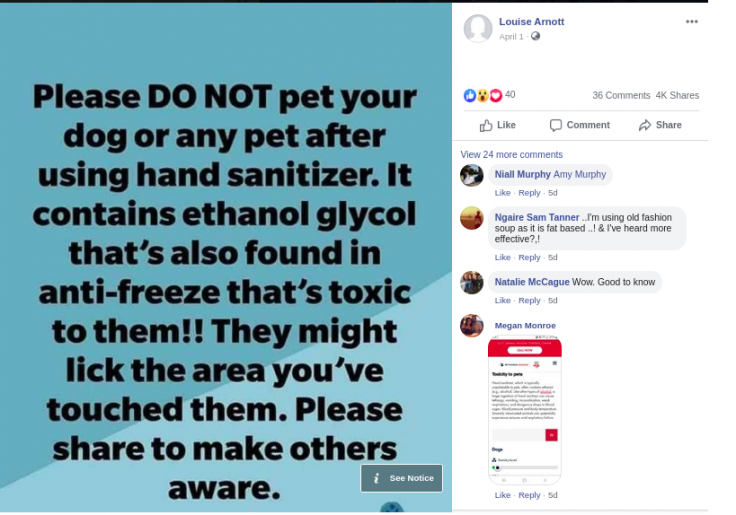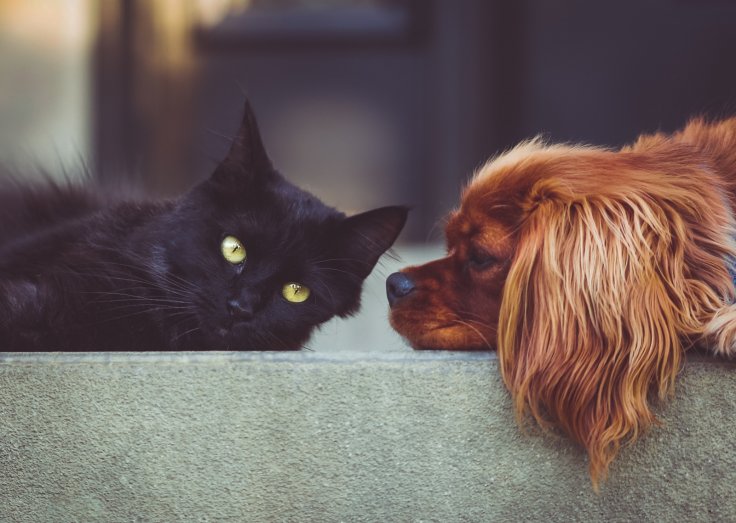Ever since the outbreak of the novel coronavirus, health experts have been suggesting the need for washing hands frequently with soap and water or using an alcohol-based sanitiser. However, due to the presence of alcohol in sanitisers, there have been multiple concerns over its safety on a daily basis.
Recently, netizens were concerned after viral messages suggested that sanitisers can even cause a severe burn if one went near a fire after applying it on the hands. Though sanitisers are flammable when poured on a surface, the little quality applied on hands is unlikely to burn the hands as it gets evaporated in less than 10-seconds.
Now, the latest claim doing the rounds on social media is that "pet owners should avoid touching animals after using hand sanitiser and forbid them from licking the sanitised hands as it contains toxic chemicals."

What's the truth behind the latest claim?
The latest claim about hand sanitiser posing a threat for animals is misleading. Health experts are of the opinion that alcohol-based hand sanitisers are safe to use (in a recommended quantity) when pets are around as only a large quantity of it could be dangerous to them. Even Facebook has flagged this piece of information as a misleading one.
Hand sanitisers should not be consumed by animals in a large quantity as it could cause ethanol poisoning, just like how it is unconsumable for human beings. But an animal that is merely licking a sanitised human hand is unlikely to have a toxic effect as it gets evaporated within seconds.
According to pet poison helpline, "Hand sanitizer, which is typically unpalatable to pets, often contains ethanol (e.g., alcohol). Like other types of alcohol, a large ingestion of hand sanitizer can cause lethargy, vomiting, incoordination, weak respirations, and dangerous drops in blood sugar, blood pressure and body temperature. Severely intoxicated animals can potentially experience seizures and respiratory failure."

Therefore, it is recommended that you keep alcohol-based hand sanitisers out of reach of animals and children, so that the possibility of accidental ingestion in large quantities is avoided. However, animals licking a sanitised hand will not become toxic unless they are remarkably sensitive to the chemical.
Coronavirus transmission from humans to animals
The novel coronavirus is believed to have originated from an animal at a wet market in Wuhan, China, though the exact source of the current outbreak is unknown as of now.
Studies have said that it can only be transmitted to human beings from an infected person, and not to animals and vice-versa. However, recently, Nadia, a four-year-old Malayan tiger, which had a respiratory illness at the Bronx Zoo in the US, was tested positive of COVID-19 raising many eyebrows. There are claims that the animal might have contracted the infection from a zoo employee.
Though not much is known about the possibility of the novel virus' transmission from humans to animals, especially pets, the US Centers for Disease Control and Prevention, has instructed pet owners not to allow their pets interact with people or other animals outside the household. They have also suggested keeping them indoors as much as possible to prevent any kind of interaction with others.








